THE OPINION OF THE “WORLD” – TO SEE
No, The Guardians of the Planet is not a film about the Greta Thunberg generation, but the subject is not so far off. Jean-Albert Lièvre’s documentary transports us, in fact, closer to the whales, to the bottom of the oceans weakened by pollution. The film adopts the point of view of the animal: it is the whales and their young who tell their story, with the voice-over of Jean Dujardin, who has melted into the mold of the animal documentary, adopting a neutral, benevolent tone, sometimes boring. “We whales…” The actor’s brother, Marc Dujardin, is the co-producer of the film with Julien Seul.
Jean-Albert Lièvre, 61, has long participated in the production of “Ushuaïa” programs for television. It was while diving, about thirty years ago, off the Turks and Caicos Islands (southeast of the Bahamas), that he found himself face to face with a humpback whale, which he had initially taken for a rocky bottom. From this magical encounter was born the desire for the film. The documentary opens with an aerial view of a humpback whale washed up on a beach. Men and women bustle around her, spreading wet, multicolored towels over her giant body – the assurance of beautiful images. The spectator follows this rescue operation at the different stages, alternating with rather amazing underwater recordings, such as this sequence of the calves breastfeeding.
Poetic aesthetics
But do not believe that the filming was intrusive. The press kit does not fail to specify that the production of the film was done with the greatest respect, avoiding disturbing the mammals, limiting travel, transport and equipment: use of silent drones to film without the need to take a boat, snorkeling and air recycling in a closed circuit, to avoid making bubbles, which would frighten whales, etc.
Whale: behind this generic word hide different families of mammals of the order of cetaceans (blue, gray, right, boreal, humpback whales, etc.), distributed in specific geographical areas. Underwater, they would be connected by their song and their language, which humans have not yet managed to decipher. The documentary fulfills its educational mission, it is not just an aquatic ballet for children. Jean Dujardin recalls that, for centuries, man behaved as an exploiter and that the industrial boom was partly made on the backs of these animals, in particular by the use of whale oil for the ‘lighting. The film is certainly uneven, sometimes resembling a television documentary, but also venturing into a more poetic aesthetic, against a backdrop of beautiful music. On the big screen, the show produces its effect.
You have 2.86% of this article left to read. The following is for subscribers only.
